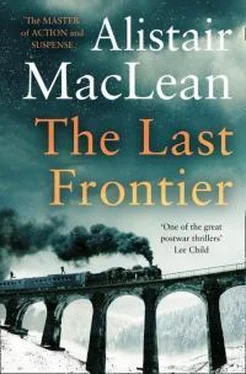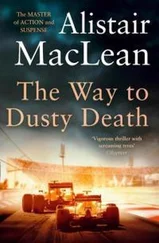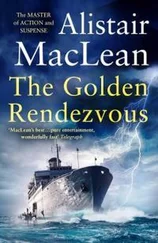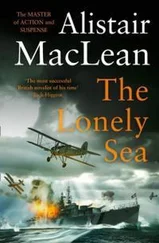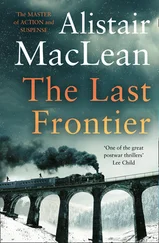Алистер Маклин - The Last Frontier
Здесь есть возможность читать онлайн «Алистер Маклин - The Last Frontier» — ознакомительный отрывок электронной книги совершенно бесплатно, а после прочтения отрывка купить полную версию. В некоторых случаях можно слушать аудио, скачать через торрент в формате fb2 и присутствует краткое содержание. Год выпуска: 2012, Издательство: Sterling, Жанр: Шпионский детектив, на английском языке. Описание произведения, (предисловие) а так же отзывы посетителей доступны на портале библиотеки ЛибКат.
- Название:The Last Frontier
- Автор:
- Издательство:Sterling
- Жанр:
- Год:2012
- ISBN:нет данных
- Рейтинг книги:3 / 5. Голосов: 1
-
Избранное:Добавить в избранное
- Отзывы:
-
Ваша оценка:
- 60
- 1
- 2
- 3
- 4
- 5
The Last Frontier: краткое содержание, описание и аннотация
Предлагаем к чтению аннотацию, описание, краткое содержание или предисловие (зависит от того, что написал сам автор книги «The Last Frontier»). Если вы не нашли необходимую информацию о книге — напишите в комментариях, мы постараемся отыскать её.
The Last Frontier — читать онлайн ознакомительный отрывок
Ниже представлен текст книги, разбитый по страницам. Система сохранения места последней прочитанной страницы, позволяет с удобством читать онлайн бесплатно книгу «The Last Frontier», без необходимости каждый раз заново искать на чём Вы остановились. Поставьте закладку, и сможете в любой момент перейти на страницу, на которой закончили чтение.
Интервал:
Закладка:
‘Fine words,’ Reynolds said coldly. ‘These are fine words. I’m sure a Hungarian boy with a Russian bayonet in his stomach would have taken great comfort from them.’
‘I am also too old to take offence,’ Jansci said sadly. ‘I am also too old to believe in violence, except as a last resort, the final fling of desperation when every hope is gone, and even then it is only a resort to hopelessness: besides, Mr Reynolds, besides the uselessness of violence, of killing, what right have I to take the life of any man? We are all our Father’s children, and I cannot but think that fratricide must be repugnant to our God.’
‘You talk like a pacifist,’ Reynolds said roughly. ‘Like a pacifist before he lies down and lets the jackboot tramp him into the mud, him and his wife and his children.’
‘Not quite, Mr Reynolds, not quite,’ Jansci said softly. ‘I am not what I would like to be, not at all. The man who lays a finger on my Julia dies even as he does it.’
For a moment Reynolds caught a glimpse that might almost have been imagination, of the fire smouldering in the depths of those faded eyes, remembered all that Colonel Mackintosh had told of this fantastic man before him and felt more confused than ever.
‘But you said – you told me that–’
‘I was only telling you why I didn’t take part in the rising.’ Jansci was his gentle self again. ‘I don’t believe in violence if any other way will serve. Again, the time could not have been more badly chosen. And I do not hate the Russians, I even like them. Do not forget, Mr Reynolds, that I am a Russian myself. A Ukranian, but still a Russian, despite what many of my countrymen would say.’
‘You like the Russians. Even the Russian in your brother?’ Mask it as he tried with politeness, Reynolds could not quite conceal the incredulity in his question. ‘After what they have done to you and your family?’
‘A monster, and I stand condemned. Love for your enemies should be confined to where it belongs – between the covers of the Bible – and only the insane would have the courage, or the arrogance or the stupidity, to open the pages and turn the principles into practice. Madmen, only madmen would do it – but without these madmen our Armageddon will surely come.’ Jansci’s tone changed. ‘I like the Russian people, Mr Reynolds. They’re likeable, cheerful and gay when you get to know them, and there are no more friendly people on earth. But they are young, they are very young, like children. And like children they are full of whims, they’re arbitrary and primitive and a little cruel, as are all little children, forgetful and not greatly moved by suffering. But for all their youth, do not forget that they have a great love of poetry, of music and dancing, and singing and folk-tales, of ballet and the opera that would make the average westerner, in comparison, seem culturally dead.’
‘They’re also brutal and barbarous and human life doesn’t matter a damn to them,’ Reynolds interjected.
‘Who can deny it? But do not forget, so also was the western world when it was politically as young as the peoples of Russia are now. They’re backward, primitive and easily swayed. They hate and fear the west because they’re told to hate and fear the west. But your democracies, too, can act the same way.’
‘For heaven’s sake!’ Reynolds crushed out his cigarette in a gesture of irritation. ‘Are you trying to say–’
‘Don’t be so naïve, young man, and listen to me.’ Jansci’s smile robbed his words of any offence. ‘All I’m trying to say is that unreasoning, emotionally-conditioned attitudes are as possible in the west as in the east. Look, for instance, at your country’s attitude to Russia in the past twenty years. At the beginning of the last war Russia’s popularity ran high. Then came the Moscow-Berlin pact, and you were actually ready, remember, to send an army of 50,000 to fight the Russians in Finland. Then came Hitler’s assault in the east, your national press full of paeans of praise for “Good old Joe” and all the world loved a moujik. Now the wheel has come full circle again and the holocaust only awaits the one rash or panic-stricken move. Who knows, in five years’ time, all will be smiles again. You are weathercocks, just as the Russians are weathercocks, but I blame neither people; it is not the weathercock that turns, it is the wind that turns the weathercock.’
‘Our governments?’
‘Your governments,’ Jansci nodded. ‘And, of course, the national press that always conditions the thinking of a people. But primarily the governments.’
‘We in the west have bad governments, often very bad governments,’ Reynolds said slowly. ‘They stumble, they miscalculate, they make foolish decisions, they even have their quota of opportunists, careerists and plain downright power-seekers. But all these things are only because they are human. They mean well, they try hard for the good and not even a child fears them.’ He looked speculatively at the older man. ‘You yourself said recently that the Russian leaders have sent literally millions in the past few years to imprisonment and slavery and death. If, as you say, the peoples are the same, why are the governments so utterly different? Communism is the only answer.’
Jansci shook his head. ‘Communism is gone, and gone for ever. To-day it remains only as a myth, an empty lip-service catchword in the name of which the cynical, ruthless realists of the Kremlin find sufficient excuse and justification for whatever barbarities their policies demand. A few of the old guard still in power may cherish the dream of world communism, but just a few: only a global war could now achieve their aims, and these same hard-headed realists in the Kremlin can see no point or sense or future in pursuing a policy that carries with it the seed of their own destruction. They are essentially businessmen, Mr Reynolds, and letting off a time-bomb under your own factory is no way to run a business.’
‘Their barbarities, their enslavements and their massacres don’t stem from world conquest?’ The fractional lift of Reynolds’ eyebrows was its own sceptical comment. ‘You tell me that?’
‘I do.’
‘Then from what in the world–?’
‘From fear, Mr Reynolds,’ Jansci interrupted. ‘From an almost terror-stricken fear that has no parallel among governments of modern times.
‘They are afraid because the ground lost in leadership is almost irrecoverable: Malenkov’s concessions of 1953, Kruschev’s famous de-Stalinization speech of 1956 and his forced decentralization of all industry were contrary to all the cherished ideas of Communist infallibility and centralized control, but they had to be done, in the interest of efficiency and production – and the people have smelled Freedom. And they are afraid because their Secret Police has slipped and slipped badly: Beria is dead, the NKVD in Russia are not nearly so feared as the AVO in this country, so the belief in the power of authority, of the inevitability of punishment, has slipped also.
‘These fears are of their own people. But these fears are nothing compared to their fears of the outside world. Just before he died, Stalin said, “What will happen without me? You are blind, as young kittens are blind, and Russia will be destroyed because you do not know how to recognize her enemies”. Even Stalin couldn’t have known how true his words would prove to be. They cannot recognize enemies, and they can only be safe, only feel safe, if all the peoples of the outside world are regarded as enemies. Especially the west. They fear the west and, from their own point of view, they fear with every reason.
‘They are afraid of a western world that, they think, is unfriendly and hostile and just waiting its chance. How terrified would you be, Mr Reynolds if you were ringed, as Russia is ringed, with nuclear bomb bases in England and Europe and North Africa and the Middle East and Japan? How much more terrified would you be if, every time the world tensions increase, fleets of foreign bombers appear mysteriously on the far edge of your long-distance radar screens, if you know, beyond any reasonable doubt, that whenever such tensions arise there are, at any given moment of the day or night anywhere between 500 and 1,000 bombers of the American Strategic Air Command each with its hydrogen bomb, cruising high in the stratosphere, just waiting the signal to converge on Russia and destroy it. You have to have an awful lot of missiles, Mr Reynolds, and an almost supernatural confidence in them to forget those thousand hydrogen bombers already airborne – and it only requires five per cent of them to get through, as they inevitably would. Or how would you, in Britain, feel if Russia were pouring arms into Southern Ireland, or the Americans if a Russian aircraft carrier fleet armed with hydrogen bombs cruised indefinitely in the Gulf of Mexico? Try to imagine all that, Mr Reynolds, and you can perhaps begin to imagine – only begin, for the imagination can be only a shadow of the reality – how the Russians feel.
Читать дальшеИнтервал:
Закладка:
Похожие книги на «The Last Frontier»
Представляем Вашему вниманию похожие книги на «The Last Frontier» списком для выбора. Мы отобрали схожую по названию и смыслу литературу в надежде предоставить читателям больше вариантов отыскать новые, интересные, ещё непрочитанные произведения.
Обсуждение, отзывы о книге «The Last Frontier» и просто собственные мнения читателей. Оставьте ваши комментарии, напишите, что Вы думаете о произведении, его смысле или главных героях. Укажите что конкретно понравилось, а что нет, и почему Вы так считаете.
